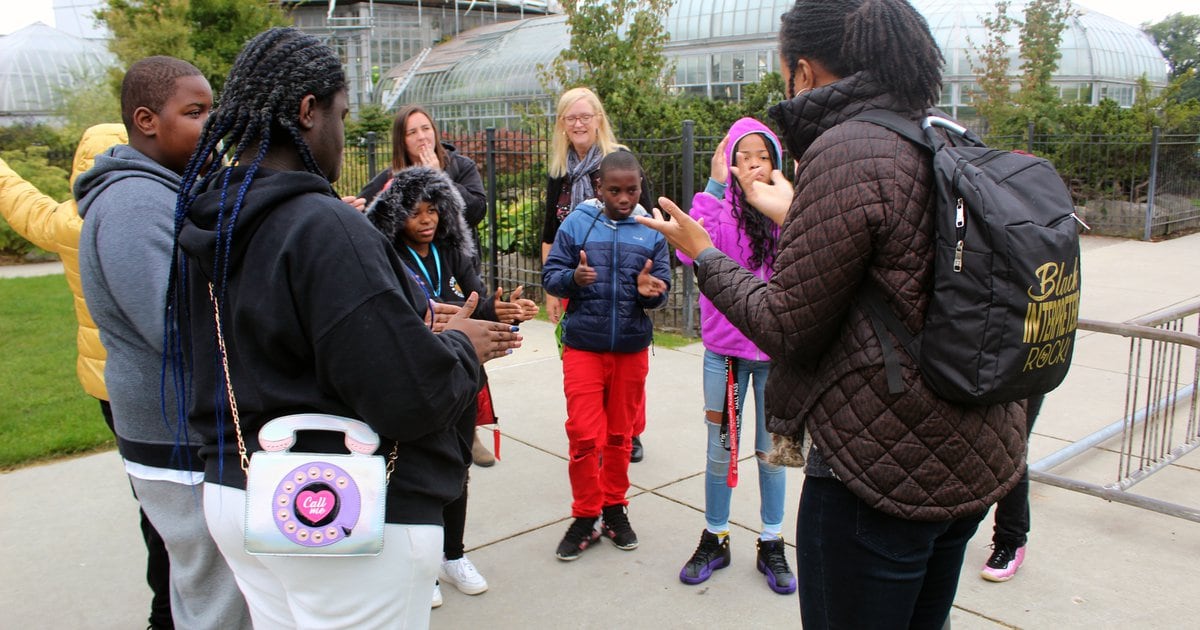During this summer, a team of students from MIT embarked on a journey to the sou …
Detroit Students Explore Nature Through Place-Based Lesson at Belle Isle
Carlos Changemaker

A group of elementary and middle school students in Detroit were mesmerized by dozens of koi swimming in a pond. The carp displayed beautiful patterns and colors, including orange and white, yellow with black spots, and more.
Standing at the metal railing of the koi pond, the students eagerly asked their instructor various questions about the fish.
Their inquiries included: “What do they eat?”, “How long do they live?”, and “How do fish get pregnant?”
Children can become incredibly curious when exposed to nature, and that was the purpose of this activity, away from the confines of the classroom.
The students were participating in a weeklong program at Detroit’s Belle Isle Aquarium and Nature Center. The program aimed to encourage them to explore and appreciate the natural wonders found in the city park.
In the midst of grappling with the academic and emotional effects of the pandemic and declining student engagement, more educators are turning to immersive place-based learning as a way to capture students’ interests and curiosity.
The significance of nature- and place-based learning is gaining recognition, with research suggesting that such opportunities can result in numerous positive outcomes such as increased motivation, improved critical thinking skills, and stronger student-teacher relationships.
June Teisan, a former Michigan Teacher of the Year, has been collaborating with the Detroit Public Schools Community District to give students with hearing disabilities the chance to explore Belle Isle, a vast island park that some young Detroit residents consider inaccessible or inhospitable.
For the past two weeks, students from Detroit’s Bunche Preparatory Academy in grades 1-8 have been transported to Belle Isle for field trips.
Teisan, the founder of the nonprofit InnovatED (313), emphasized the importance of providing students with access to nature, acknowledging the mental and physical health benefits it offers.
She said, “Not everybody’s going to love bugs like I did, or not everybody’s going to enjoy reading a book here and there. But connecting with (students) and understanding more about them and saying, ‘How can I meet the needs, the interests and the passions that you bring with you?’ is important.”
The field trips draw inspiration from “the Big Lesson,” a similar program created by Margaret Holtschlag, another Teacher of the Year, that serves students across mid-Michigan.

Outdoor learning sparks student curiosity
On that particular day at Belle Isle, students eagerly examined Petri dishes filled with water collected from the nearby marina. Armed with a magnifying glass, a plastic spoon, and a pipette, they quickly discovered the presence of mayflies and dragonflies.
Amy Emmert, the director of education at the Belle Isle Conservatory and the instructor for the week’s lessons, explained, “This is what ducks and fish are digging for. This is what they eat.”
Husam Alnsiwi, an eighth-grade student aspiring to become a scientist, found the experience particularly thrilling. He expressed a desire to study chemistry and learn about real-world things through experimentation.
Accompanied by a classroom teacher and a team of sign-language interpreters, the students were given an important opportunity to explore their own community and participate in activities that are often not tailored to their needs.


